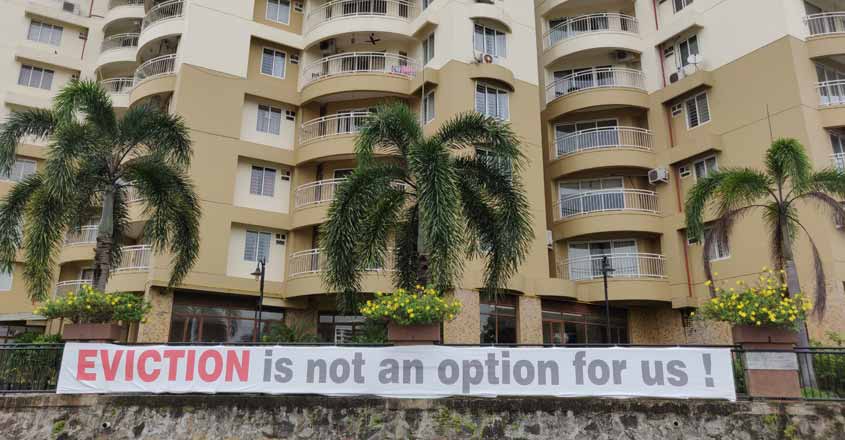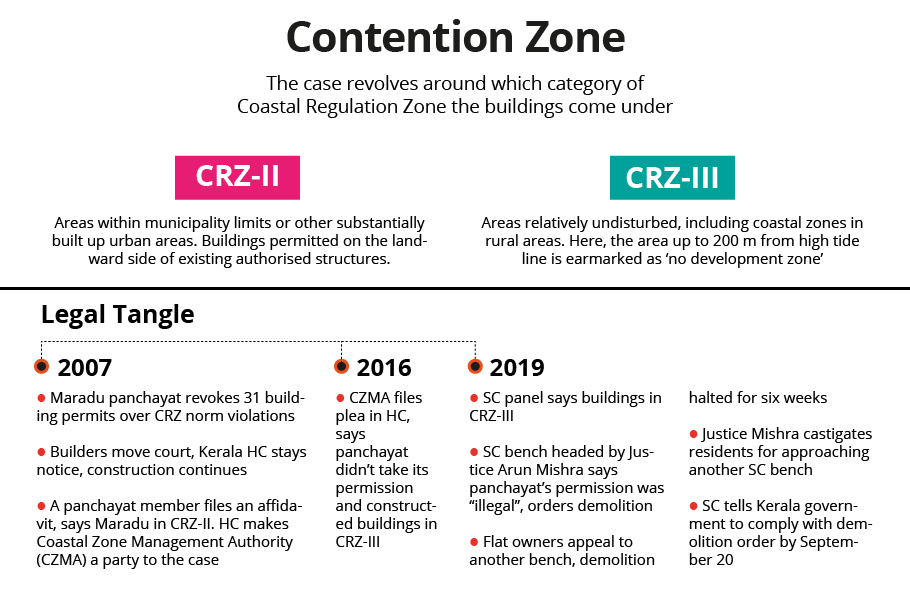
Maradu flat demolition order in Kerala leaves residents in the lurch

The Supreme Court’s directive to demolish a group of prime waterfront high-rise apartment complexes near Kochi in Kerala over violation Coastal Regulation Zone (CRZ) norms has snowballed into a major controversy.
The demolition of H2O Holy Faith, Golden Kayaloram, Alfa Serene and Jain’s Coral Cave in Maradu in Ernakulam district, which houses around 400 families in the backdrop of scenic Kochi backwaters, are to be completed by September 20.
Although the state government has found alternative places for temporary stay for the residents, including in schools, flats and community halls, the residents are staying put, saying they will not leave their homes. The deadline for the vacation expired at 5 pm on Sunday (September 15).
“We consist of more than 2,000 members including many senior citizens, NRIs, widowed individuals and aged couples. Where do we go in a short span of time? What do we do with our family and belongings? What about compensation or rehabilitation? The Supreme Court does not want to know anything about us. The demolition will cost around Rs 400-450 crore. What about our possessions?” asked a resident from Holy Faith apartments on condition of anonymity.
Also read: Flats demolition: Kerala CM Vijayan calls for all party meeting on Tuesday
Former Kerala chief minister Oommen Chandy joined the protest with members of Kerala Chamber of Commerce and Industry, Muslim League on Monday (September 16) and called for a solution to save Maradu flats from being demolished.
“We will find a solution to this issue. The residents were not asked about the permission to demolish flat nor were they informed about the prevailing issues earlier. Conservation is an important aspect but it has to be implemented only on humanitarian grounds,” he said.
What led to the demolition order?
The issue arose in 2007 when the vigilance wing of Maradu panchayat ordered cancellation of the permits, a year after it was given to the builders. It had said that the constructions had not gotten mandatory clearance from Kerala State Coastal Zone Management Authority (KSCZMA), triggering a legal battle.
The builders approached the Kerala High Court and got a stay on the cancellation and continued the construction.
Later, the Maradu village panchayat told the HC that the area was mistakenly categorised under Category III, whereas it should have been under Category II. CRZ Category III areas are critically vulnerable and no construction is allowed within 200 metres from the coast whereas in CRZ-II zone, works are allowed up to 50 metres from the coast.

In 2010, Maradu, which is 7 km from Kochi, was upgraded to a municipality. Two years later, the court went with the panchayat’s statement and declared the area under CRZ Category II norms.
In the same year, the KSCZMA approached the Supreme Court, saying it was not consulted when the permission was given for the complexes and that it did indeed fall under CRZ Category II norms.
Based on a study carried out by a three-member panel of experts appointed by it, the Supreme Court on May 8 this year declared the panchayat permit as illegal and void, and ordered the demolition of the structures.
In July, the apex court dismissed the review pleas filed by the builders. On September 6, the court issued an ultimatum for the demolition and file a compliance report by September 20.
Builders’ apathy
In the fight between environmentalists and developers, residents are left in the lurch.
“The builders are not even responding to our queries. They have separately given appeal to reject the order, but aren’t they accountable to us? They are washing their hands off in the issue. Isn’t this cheating? None of us are planning to move out of our houses. How do you expect us to?” Shibu George, a resident of Jain Constructions.
He said that Jain Constructions had gotten away with such issues in the past by paying fine. The constructions have also been stopped mid-way in Kakkanad.
Jain Constructions and the other developers were not available for comments immediately.

